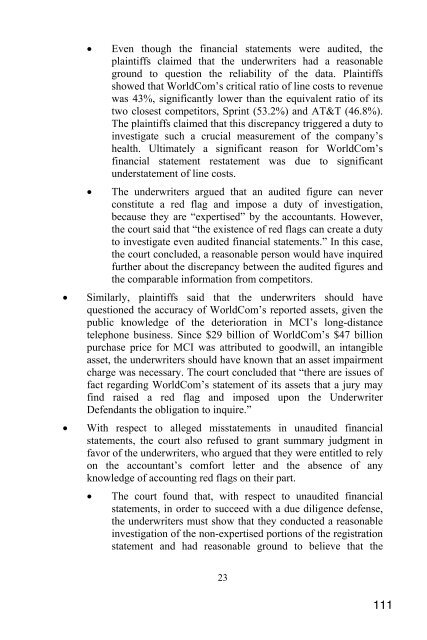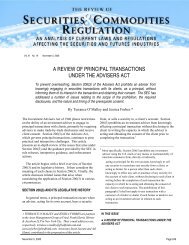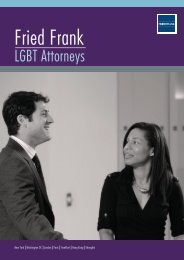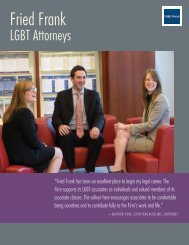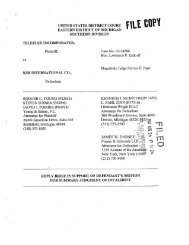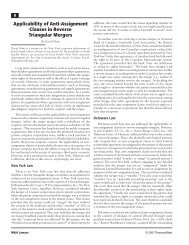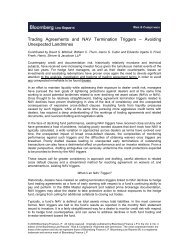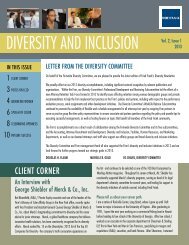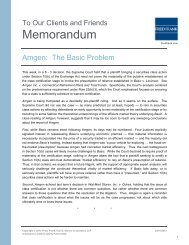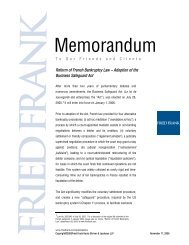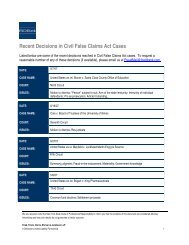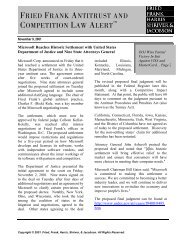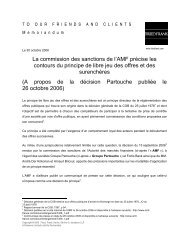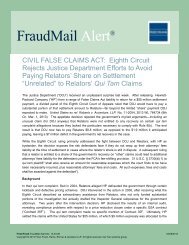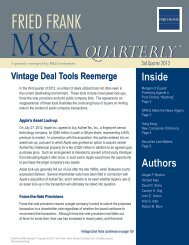The due diligence process from the underwriter's - Fried Frank
The due diligence process from the underwriter's - Fried Frank
The due diligence process from the underwriter's - Fried Frank
You also want an ePaper? Increase the reach of your titles
YUMPU automatically turns print PDFs into web optimized ePapers that Google loves.
• Even though <strong>the</strong> financial statements were audited, <strong>the</strong><br />
plaintiffs claimed that <strong>the</strong> underwriters had a reasonable<br />
ground to question <strong>the</strong> reliability of <strong>the</strong> data. Plaintiffs<br />
showed that WorldCom’s critical ratio of line costs to revenue<br />
was 43%, significantly lower than <strong>the</strong> equivalent ratio of its<br />
two closest competitors, Sprint (53.2%) and AT&T (46.8%).<br />
<strong>The</strong> plaintiffs claimed that this discrepancy triggered a duty to<br />
investigate such a crucial measurement of <strong>the</strong> company’s<br />
health. Ultimately a significant reason for WorldCom’s<br />
financial statement restatement was <strong>due</strong> to significant<br />
understatement of line costs.<br />
• <strong>The</strong> underwriters argued that an audited figure can never<br />
constitute a red flag and impose a duty of investigation,<br />
because <strong>the</strong>y are “expertised” by <strong>the</strong> accountants. However,<br />
<strong>the</strong> court said that “<strong>the</strong> existence of red flags can create a duty<br />
to investigate even audited financial statements.” In this case,<br />
<strong>the</strong> court concluded, a reasonable person would have inquired<br />
fur<strong>the</strong>r about <strong>the</strong> discrepancy between <strong>the</strong> audited figures and<br />
<strong>the</strong> comparable information <strong>from</strong> competitors.<br />
• Similarly, plaintiffs said that <strong>the</strong> underwriters should have<br />
questioned <strong>the</strong> accuracy of WorldCom’s reported assets, given <strong>the</strong><br />
public knowledge of <strong>the</strong> deterioration in MCI’s long-distance<br />
telephone business. Since $29 billion of WorldCom’s $47 billion<br />
purchase price for MCI was attributed to goodwill, an intangible<br />
asset, <strong>the</strong> underwriters should have known that an asset impairment<br />
charge was necessary. <strong>The</strong> court concluded that “<strong>the</strong>re are issues of<br />
fact regarding WorldCom’s statement of its assets that a jury may<br />
find raised a red flag and imposed upon <strong>the</strong> Underwriter<br />
Defendants <strong>the</strong> obligation to inquire.”<br />
• With respect to alleged misstatements in unaudited financial<br />
statements, <strong>the</strong> court also refused to grant summary judgment in<br />
favor of <strong>the</strong> underwriters, who argued that <strong>the</strong>y were entitled to rely<br />
on <strong>the</strong> accountant’s comfort letter and <strong>the</strong> absence of any<br />
knowledge of accounting red flags on <strong>the</strong>ir part.<br />
• <strong>The</strong> court found that, with respect to unaudited financial<br />
statements, in order to succeed with a <strong>due</strong> <strong>diligence</strong> defense,<br />
<strong>the</strong> underwriters must show that <strong>the</strong>y conducted a reasonable<br />
investigation of <strong>the</strong> non-expertised portions of <strong>the</strong> registration<br />
statement and had reasonable ground to believe that <strong>the</strong><br />
23<br />
111


